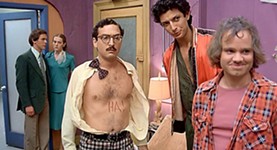Page Two: Ringing True
The Constitution and the films of Joan Micklin Silver stand above the noise as the alt-weekly series concludes
By Louis Black, Fri., Aug. 20, 2010
I have heard what the talkers were talking, the talk of the beginning and the end,
But I do not talk of the beginning or the end.
– Walt Whitman, Leaves of Grass
The braying is always there. It may increase or lessen in intensity, but it is nonstop. I have relatively mild tinnitus, which means that there is a constant, low-level, white-noise sound in my ears. Very rarely does it become disturbing, but when it does, I find that in the case of ongoing torture, consistency trumps intensity. Similarly, the most annoying aspect of the braying is that it never stops.
There are people who will tell you that morality, civility, and values are dead, that living by a code of honor is as fanciful as believing in the tooth fairy. Those people will articulate and enumerate every tone of corruption and every story of moral cowardice they know of or have ever heard. Mostly, they are excusing and forgiving themselves. If half a village has the plague, is the entire village sick? Maybe it is half-well?
There are those who love to cry doom, who claim the sky is falling and that they are among the few sharp enough to notice what the rest of us are too stupid to see. They'd love to save us, if they could, but the problem is that we are not as aware, smart, and open-minded as they are. The most simplistically minded (which often makes them the most dangerous) are those on the left or the right who claim there is only one way of thinking, one ideology, one politics that is true. They know what it is. They know all other beliefs are lies.
The entire U.S. Constitution is a beautifully crafted and very deliberate rejection of that belief. Clearly, the Founding Fathers thought the single most dangerous course for this country would be if one set of beliefs, one set of political convictions, were to come to dominate our government.
Certainly, one can argue that there is one absolute, solid, knowable truth and that all other beliefs, thoughts, and understandings are lies. Tying this argument to a belief in the Constitution or the republic, however, is simply dishonest. There is a name for the type of government based on the premise that there is one truth, a knowable truth, and only that truth, while there are many, many lies: political, moral, spiritual. It is called totalitarianism.
Tonight, again, I watched Sam Peckinpah's The Wild Bunch, as I have watched it for more than four decades. It reminded me that morality and honor are not granted by others, nor are they absolutes. One tries one's best to live by the standards one believes.
I know no "truths." I have many opinions, thoughts, and feelings – but no "truth." People have many opinions, thoughts, and feelings that are different from those held by other people. None of them knows the truth nor owns it, no matter what they say. But this I do know: No matter how much some may differ with the way others think, when expressing these opposing opinions they are not "lying" or "deliberately misleading." How damn self-celebratory to not only claim to know the truth but to follow that with asserting that almost everyone who disagrees with you is lying.
I'm claiming no truth. I have no privileged understanding – my moral center is only mine, not that of the universe – nor do I have a track record of George Washington-type veracity nor any special claim to honor.
Aspiring to moral and ethical standards does not mean you are achieving them. But knowing you live in their shadows is everything.
Sick of the braying – the constant verbal noise flooding the air of accusations, personal attacks, doom-saying, the condemnations of humanity, the indictments of other people – I find there is no way not to think of Whitman: "I hear America singing, the varied carols I hear."
It is hard not to wish that instead of the dark, dirty, angry, angry noise of our countrymen these days, we got to hear what Whitman heard:
"The wood-cutter's song, the ploughboy's on his way in the morning, or at noon intermission or at sundown,
"The delicious singing of the mother, or of the young wife at work, or of the girl sewing or washing,
"Each singing what belongs to him or her and to none else,
"The day what belongs to the day – at night the party of young fellows, robust, friendly,
"Singing with open mouths their strong melodious songs."
This is the final part of the recent series on the weekly press. It is about the reason for all those columns in the first place. Joan Micklin Silver's Between the Lines (1977), one of the few films about the alternative press, has been unavailable in any home format for a number of years. Now Amazon has it on DVD with a list price of $19.98.
The context for Between the Lines is the tangled, confused, and confusing family tree of alternative weeklies in Boston. Without going into detail, because I can't: In 1966, Boston After Dark began publication. Among the founders of BAD was Stephen Mindich, who by the turn of the decade had acquired a controlling interest in the paper. In 1969, The Cambridge Phoenix began publication. In 1972, the Phoenix's writers began a strike against the paper. Shortly thereafter, the paper was sold to BAD, resulting in The Boston Phoenix. Some of the Phoenix staff then began The Real Paper (1972).
Between the Lines was directed by Silver from a screenplay by Fred Barron, a former Boston Phoenix and Real Paper writer. The film is very loosely based on the sale of the Phoenix to BAD.
The story is that Silver brought her first (independent) feature, Hester Street (1975), to the Orson Welles Cinema in Boston. After the screening, there was a dinner for Silver. At the dinner, when asked what film she was going to do next, she said she was looking for scripts. Barron left for a few minutes, returning to hand her his script for Between the Lines. It became her next film. Barron went on to write movies as well as produce and write for television.
Critically well-received, Hester Street was about the Jewish immigrant experience in New York City and was Silver's first narrative feature. Somewhat surprisingly, Silver is grievously more ignored than underrated (surprising because there were so few contemporary women directors).
Most of her filmography is stellar, with two stunning stand-outs, Between the Lines and Chilly Scenes of Winter (aka Head Over Heels) (1979).
Between the Lines is about an underground weekly in Boston that is being sold to a wealthy new publisher, though the staff is being kept mostly in the dark about what is happening. The film is wonderful – not just because it is about what we at the Chronicle do for a living but because it is set in the Boston we lived in during the Seventies. The clothes people wear and the apartments they live in, as well as what they say and feel about one another, ring true.
The cast is fantastic, with some of the characters all-too-familiar types in the world of weeklies. John Heard plays an overly cynical, already burned-out writer. His ex-girlfriend, played by Lindsay Crouse, is a photographer still enthusiastic about her work. Other staff/cast members include Jill Eikenberry as the den mother/receptionist, Marilu Henner as a stripper, Bruno Kirby as a would-be cub reporter, Stephen Collins as the snotty writer who has an eye on much greener fields than the alternative press, and Gwen Welles as his girlfriend. Lane Smith is the wealthy, profit-focused buyer.
But every brilliant performance in this film pales in the face of Jeff Goldblum as the rock critic. This is very early Goldblum. Before this he had been in a few movies – Death Wish, the silent biker in Nashville – but this is his first 100%, full-steam-ahead Jeff Goldblum performance.
Finally, there is the ever-constant, confused Michael J. Pollard performance as a paper hawker.
Silver went on to direct a number of other – all interesting, some better than that – films, but I'd be remiss to not mention Chilly Scenes of Winter. Based on Ann Beattie's novel, it stars John Heard, Mary Beth Hurt, (a truly brilliant) Peter Riegert, Kenneth McMillan, and (the always wonderful) Gloria Grahame. A man falls in love with a woman. She is married but estranged. He falls head over heels for her. She goes back to her husband.
The film is also set in the very real world we know; it's not a glitzy Hollywood reflection. There are a handful of adult romance films that stand apart from the mass of them – The Palm Beach Story, Before Sunset, Last Tango in Paris – and this film is among them.












